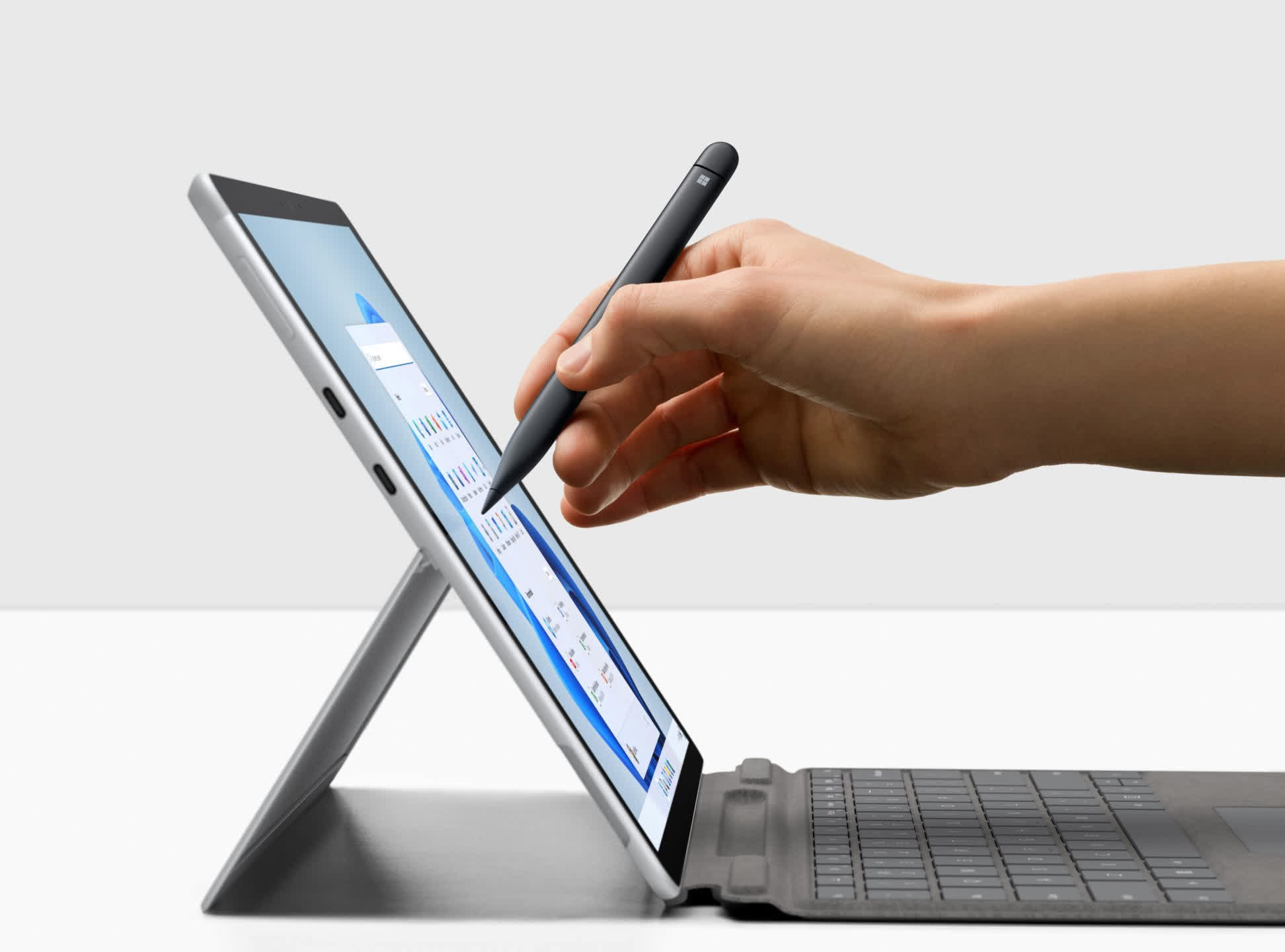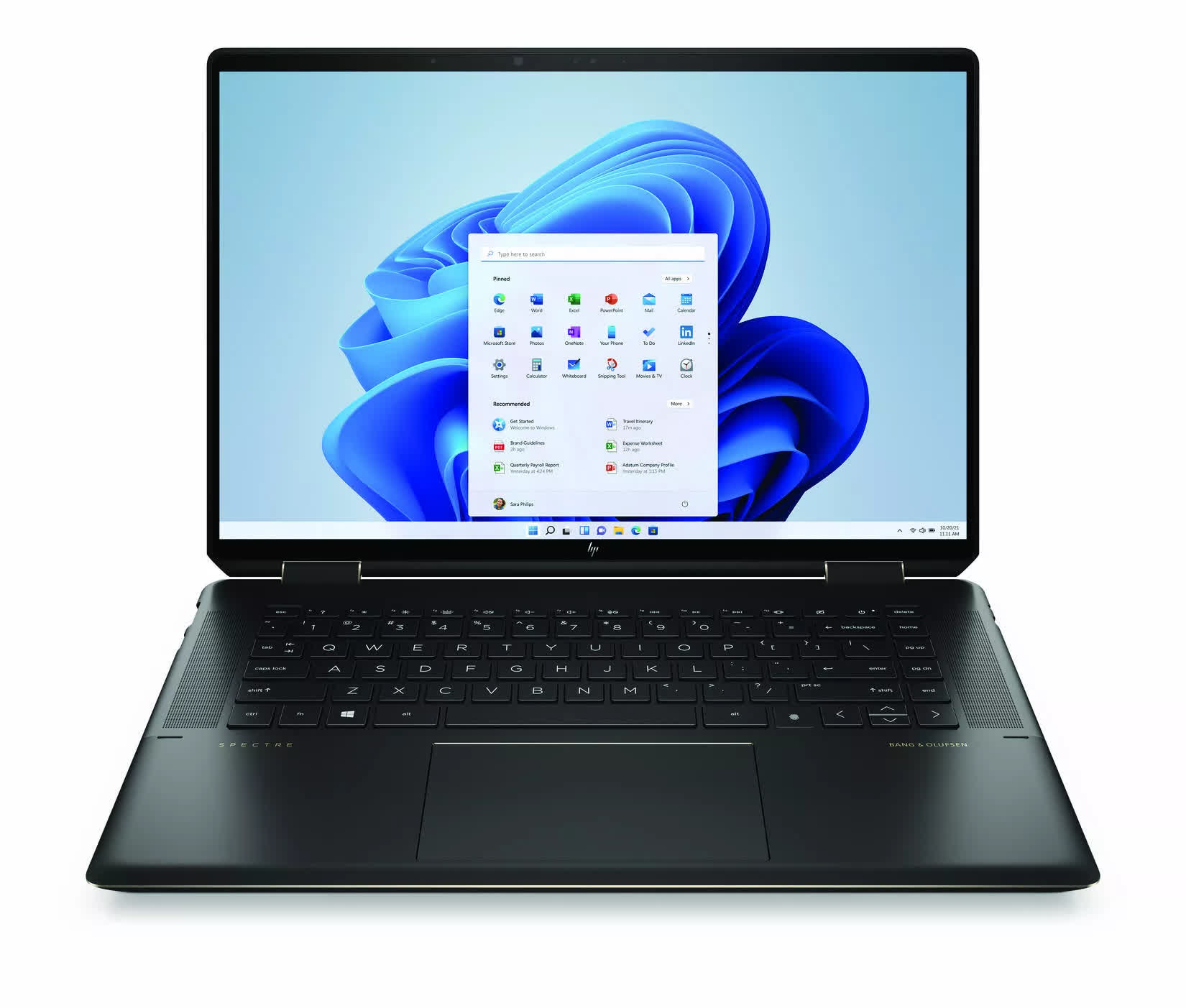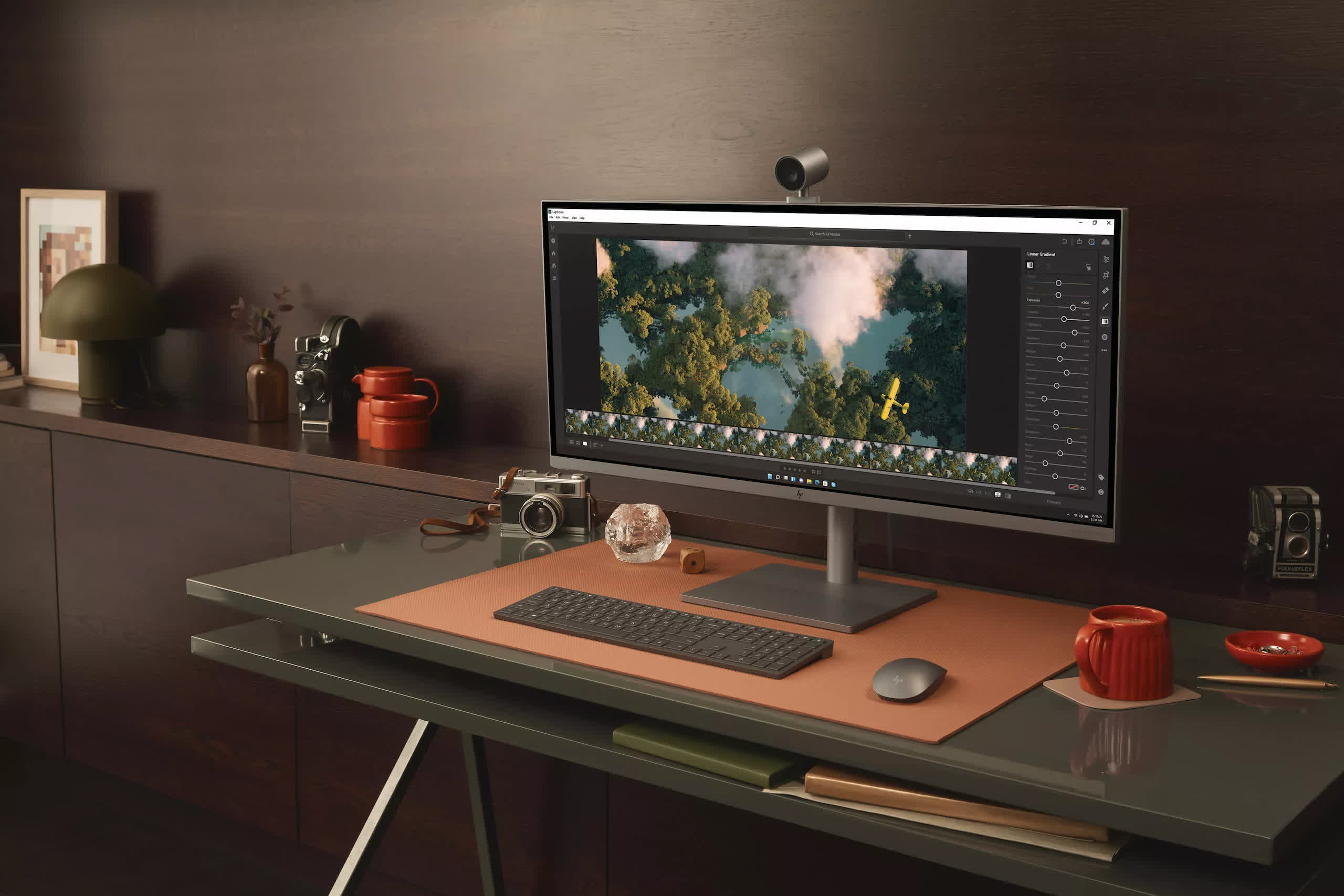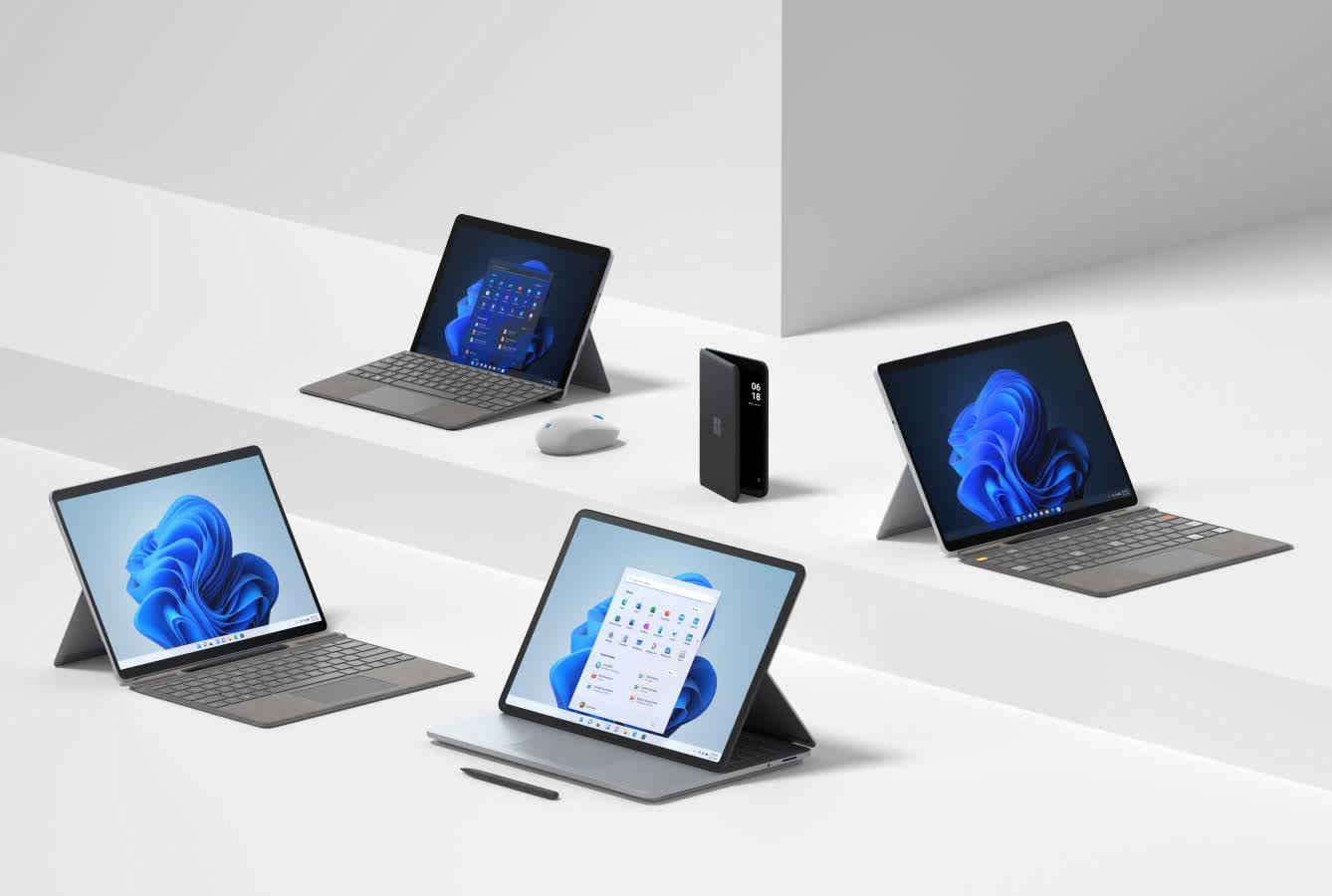Why it matters: More than ever before, PCs have become critical devices for a huge variety of people. The requirements for new PCs have also evolved, particularly when it comes to communication and collaboration. Thankfully, many PC vendors have taken these trends to heart, and starting this fall we'll be seeing some of the first new machines that were designed post-pandemic. Toss in the fact that these new PCs were crafted with Windows 11 in mind, there's a lot to look forward to.
Kicking things off, HP and Microsoft have debuted a range of creative new PC designs, which highlight that despite the age of the category, innovation in the PC world is still alive and well.
HP unveiled PCs in several different form factors – from a tablet to a 2-in-1 convertible to a huge, widescreen all-in-one – as well as new monitors and software tools. The software is designed to make the PC communication experience better across these new PCs and to extend its capabilities to multiple screens.
The HP 11-inch Tablet PC offers a highly portable, inexpensive ($599 with a keyboard, $499 without) option for people looking for a lightweight, touch-capable device with a high-resolution (13 MP) rotating camera, detachable keyboard, and built-in kickstand that supports both landscape and portrait modes. The idea is to offer a Windows 11 option to those looking for a modern tablet design.
In the convertible space, HP's new Spectre x360 16-inch builds on the company's line of 2-in-1 designs with a bigger, higher resolution (3K+) display, 5 MP camera with IR support for Windows Hello, and the latest Intel Evo platform powered by an 11th-gen Core i7 and an optional RTX 3050 discrete GPU. Other cutting-edge technologies include two Thunderbolt 4 USB-C ports (plus USB-A, HDMI, and headphones), integrated Wi-Fi 6E and Bluetooth 5.2 wireless, and 32 GB of Intel Optane Memory.
The latest Spectre x360, which starts at $1,639, is built with both recycled aluminum and plastic and includes HP's new Tilt Pen and Protective Sleeve in the box. On the software side, the company's new GlamCam app adjusts the light sensitivity of the built-in camera and offers "beauty" filters that can improve your appearance on video calls, regardless of the environment in which you make them.
For many people who are now comfortable working from home, desktop PCs have taken on new relevance and importance during the pandemic, particularly if they're connected to large displays. Addressing both of those issues, HP's Envy 34 AIO PC starts at $1,999 and incorporates a big 34" ultrawide 5K display and offers both Intel's top-of-the-line 11th-gen Core i9 CPUs along with an option for Nvidia's GeForce RTX 3080 GPU.
The default configuration includes a Core i7 and the GeForce RTX 1650 with Max-Q for space and power savings. As a long-time user of large, ultrawide displays, I can heartily verify that once you've tried one of these, there is no going back. Interestingly, Envy 34 also comes with a detachable, magnetic 16 MP camera that you can easily connect anywhere on the monitor.
HP also unveiled a new standalone 34" curved monitor, the M34d priced at $529, and a new 32" 4K HDR monitor called the U32 (and priced at $499) that can be connected to these and any other existing PCs. In addition, on the software side, HP bundled the Duet for HP application, which lets you extend your screen across other nearby devices, with the Tablet 11.
As expected, Microsoft has also refreshed a large portion of its Surface product line this week and made a very notable and powerful addition in the form of the Surface Studio Laptop, a new design that evolves the Surface Laptop with a convertible screen design that's similar to the Surface Studio desktop PC.
On the low-end, the latest version of the Surface Go 3 ($399) ups the processor to a 10th-gen Intel Pentium and offers a Core i3 option, making it a more viable option for those who want a lightweight Windows 11 machine with reasonable performance. The company also reduced the price on the 4G LTE modem-equipped version to $499, making it one of the least expensive cellular-equipped tablets/PCs on the market.
In another pricing move, Microsoft is offering a version of the Qualcomm-powered Surface Pro X for $899, but it's a Wi-Fi only version. As a big believer in the value of cellular-equipped PCs – and seeing mobile broadband connectivity as one of the big advantages of the Arm-powered Qualcomm chip-equipped versions of Surface – I have to admit to scratching my head a bit on this one. However, Microsoft assured me that customers interested in Arm-powered Surfaces are asking for this option, so I'll give them the benefit of the doubt.
Unfortunately, the latest Surface Pro X has no changes or enhancements to that Qualcomm processor – we'll apparently have to wait until next year for improvements there.
The Surface Pro 8 and related peripherals include several important enhancements this time around. Notably, the screen has grown to 13", reducing the bezel around the display in the process, and the screen refresh rate has been bumped up to 120 Hz for super smooth scrolling.
The CPUs sees an upgrade to 11th-gen Core chips and (at last!) Microsoft has added two Thunderbolt 4-equipped USB-C ports. The design has more of the look and feel of the Surface Pro X, and, importantly, the new Surface Pro 8, which starts at $1,099, gets the cool keyboard design with the integrated pen storage (and charging) that Microsoft first debuted on the Surface Pro X.
Speaking of which, the new Surface Pro 8 keyboards feature a stiffer, yet more lightweight design, thanks to the use of carbon fiber. The new $129 Surface Slim Pen 2 that fits into the keyboard features haptic feedback, thanks in part to a new custom Microsoft G6 chip, and a more pointed design, which are supposed to give a truer pen-on-paper-like experience.
The real star of the show (at least on the PC side – the latest Surface Duo 2 phone is also a big step up) is the Surface Laptop Studio, which starts at $1,699. Quite frankly, this looks to be the Surface device I've always wanted, and I expect it to become a new fan favorite.
It starts out with a powerful set of performance and connectivity specs. The traditional-looking laptop design has a large 14.4", 120 Hz refresh rate, 2,400 x 1,600-pixel resolution display, a very large haptic touchpad, two built-in Thunderbolt 4-equipped USB-C ports, 11th-gen Core CPUs, AI-powered smart camera, and optional Nvidia discrete graphics (the RTX 3050 Ti for consumers and the equivalently-powered Quadro A2000 for enterprise). In addition, there's a magnetic spot under the front lip of the machine's design that lets you store and charge the Slim Pen 2.
What makes the Surface Laptop Studio stand out is the new convertible screen that you can pull forward into two main positions or modes (in addition to normal Laptop mode). Pulling it all the way forward and sliding it down gives you the full-screen tablet experience you've come to expect from Surface devices via what Microsoft is calling Studio Mode. In the middle is a new Stage Mode with a slanted screen that lets you easily consume content like streaming video, participate in video calls, give presentations, etc.
As with most Surface designs, Microsoft has thought through important usability details for this new design as well. First, there's a magnetic lock for the screen just beyond the keyboard that lets you easily put the Laptop Studio into (and out of) Stage mode. Second, you can also flip the screen over in that mode (or in Laptop Mode) to let you present to others in front of you. While extended hands-on experience will be the real test here, it certainly looks to be a great new way to get more value and productivity out of your PC.
All told, these new HP and Microsoft designs are great examples of the ongoing innovation that continues to occur in this nearly 40-year-old product category. By leveraging some of the new capabilities built into Windows 11, such as Snap windows among others, the new designs bring more experiences to the PC right at a time when they are most needed.
Bob O'Donnell is the founder and chief analyst of TECHnalysis Research, LLC a technology consulting firm that provides strategic consulting and market research services to the technology industry and professional financial community. You can follow him on Twitter @bobodtech.



